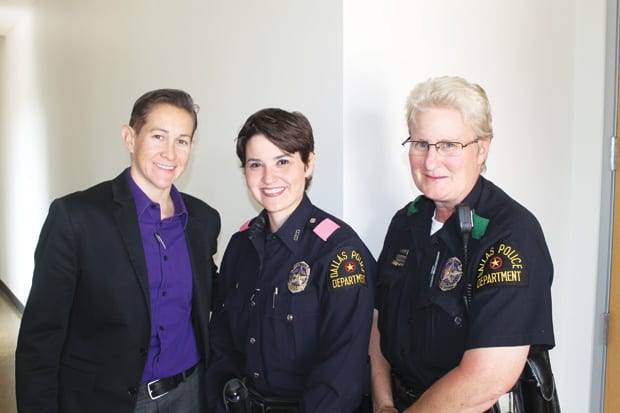Vote comes despite emotional testimony from the dozen Dallas police officers that attended the pension board meeting to ask for equal benefits for their spouses

DEMANDING EQUALITY | Officers Kassandra Schiver, left, Monica Cordova, center, and M.E. Hershiser told the Dallas Police and Fire Pension Board they put their lives on the line every day like every other Dallas police officer but aren’t given the same pension benefits for their spouses that the opposite-sex spouses of other Dallas police officers and firefighters. (David Taffet/Dallas Voice)
Four city councilmen who sit on the Dallas Police and Fire Pension Board made it clear to the rest of the board that the city council’s intention is for LGBT employees to be treated equally. A majority of that board, however, still voted Thursday, Oct. 9, to delay efforts to offer equal benefits to the spouses of LGBT police officers and firefighters.
About a dozen lesbian Dallas police officers attended the meeting to express in sometimes emotional and sometimes angry terms their expectations that they would treated equally by the board.
Despite that, the board voted against putting an amendment on an upcoming ballot to treat same-sex spouses equally with opposite-sex spouses when it comes to pension payments.
Instead, a committee was formed to study the issue and report back to the board in two months.
Dallas City Councilman Lee Kleinman, a member of the pension board, made the motion to have members vote to amend the board’s definition of spouse to anyone married in Texas or any other state.
He said the issue is settled in the city of Dallas, and mentioned the city’s 2002 nondiscrimination ordinance and a resolution the council passed earlier this year instructing all departments and agencies to make sure all of their policies treat LGBT employees equally.
The board allowed visitors to speak and many of the officers took the opportunity to ask for equal pension benefits.
Currently, if an officer dies, an opposite-sex spouse receives the pension for the rest of his or her life. Officers without opposite-sex spouses may name a beneficiary who would receive benefits for 10 years.
Police Lt. Barbara Hobbs has been with her partner 27 years and has an equal amount of time on the force. She pointed her finger at one of the board members and spoke emotionally.
“If you got married today, your wife would have benefits,” she said. “All I’m asking is for you to do the right thing. I want my family taken care of. I take care of yours.”
Officer Rhonda Davis was more blunt.
“I want my partner protected if I go out on the street and am shot and killed,” she said.
Officer Kassandra Schiver said she has been on the police force 10 years and was recently married in Washington.
“We put our lives on the line every day we go to work,” she said of herself and her fellow LGBT officers. “We want to know our families are taken care of.”
Four members of the Dallas City Council — Kleinman, Scott Griggs, Philip Kingston and Mayor Pro Tem Tennell Atkins — sit on the pension board. And all four supported Kleinman’s amendment.
But seven of the other board members objected, saying that there isn’t time to educate the rank-and-file officers and firefighters about the issue.
Kingston and Kleinman both said they’ve visited police and fire stations and their sense is that personnel already understand the issue.
“This is real easy,” Kingston said. “People get it. This one’s a no-brainer.”
He dispelled one issue — that adding spouses of gays and lesbians would have a negative effect on the pension fund. He said actuarially he was told this would have no effect on the fund.
As one board member said time was needed to educate the rank and file, DPD officer M. E. Hershiser who has served on the force for 29 years said, “We’re not that different. What are we going to educate?”
Board members latched onto the “need more time to study” excuse to postpone a vote and said meetings were held around the city on other issues that will be on the ballot at the end of October.
“And no one attended those meetings,” Kingston said.
In addition to the four council members, only one other board member voted for the proposal, while the other seven voted against it.
Griggs made a proposal to form a committee to study the issue and bring back a recommendation. Board members who opposed the issue either didn’t want a time line or wanted a report in six months.
Griggs said that was too long and proposed the committee report back in two months so the board could vote in three months.
Hobbs stood and again pointed her finger at a board member, asking: “Would any of you suspend your spousal benefits during this time?”
Because of her passion on the issue, the board asked Hobbs to sit on the committee.
Outside the meeting, Hobbs said the vote wasn’t shocking. She said she is satisfied with the defined timeline and glad that gay and lesbian employees affected by the decision were asked to come to the table.
She said the time is right for equality issues to come forward in the police and fire departments and called the climate safer than it was 15 or 20 years ago.
“It’s easier for LGBT officers to step forward” now, she said.
Atkins stepped outside the room after the vote to console the officers who attended, thank them for speaking so forcefully and assure them they would pursue the issue until they were given equal benefits.
But Atkins was clearly exasperated by the actions of his fellow board members.
“How can they do this … to their face?” he said of the vote to deny the amendment to treat officers equally, even as those officers were in the room.
This article appeared in the Dallas Voice print edition October 10, 2014.


